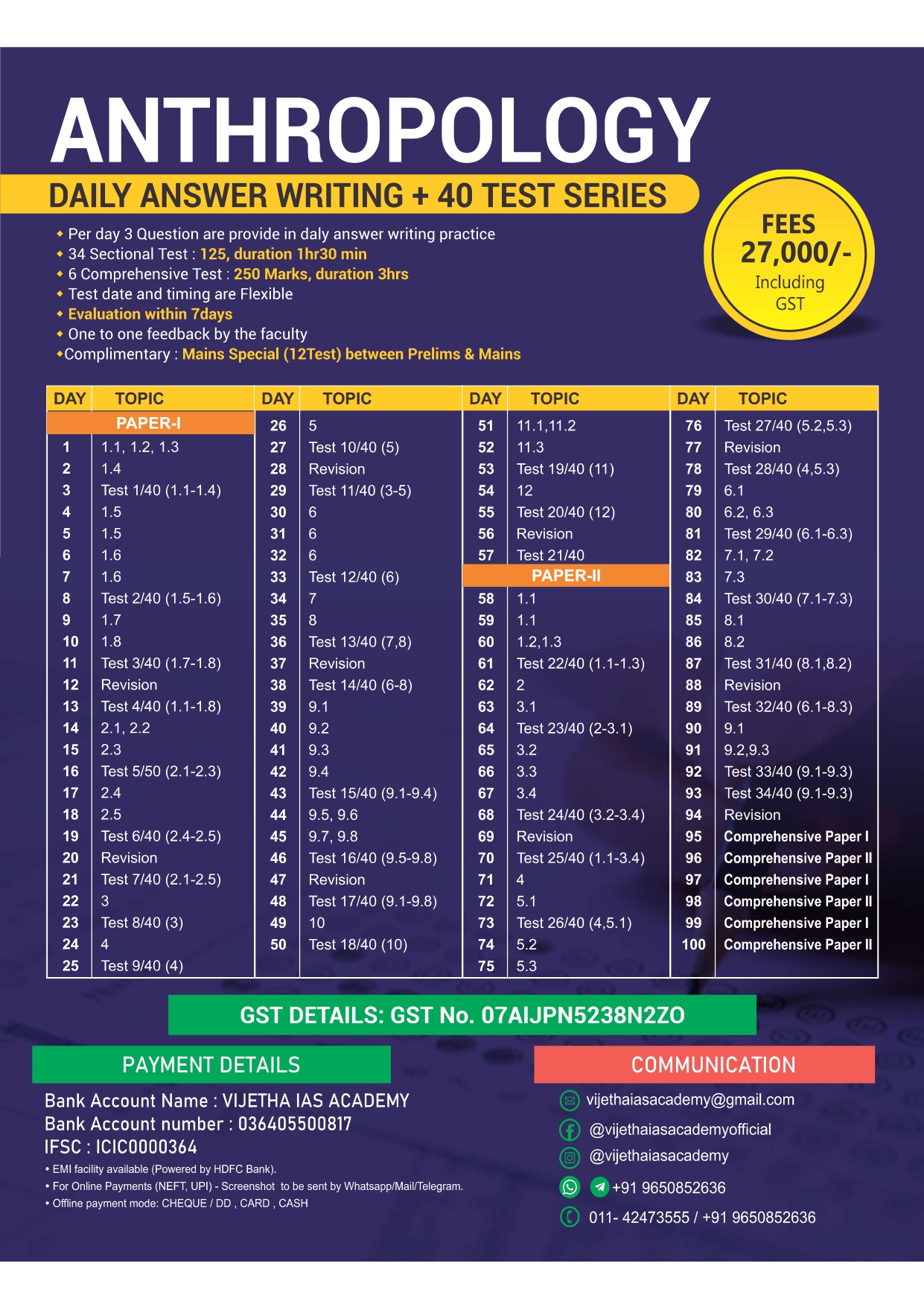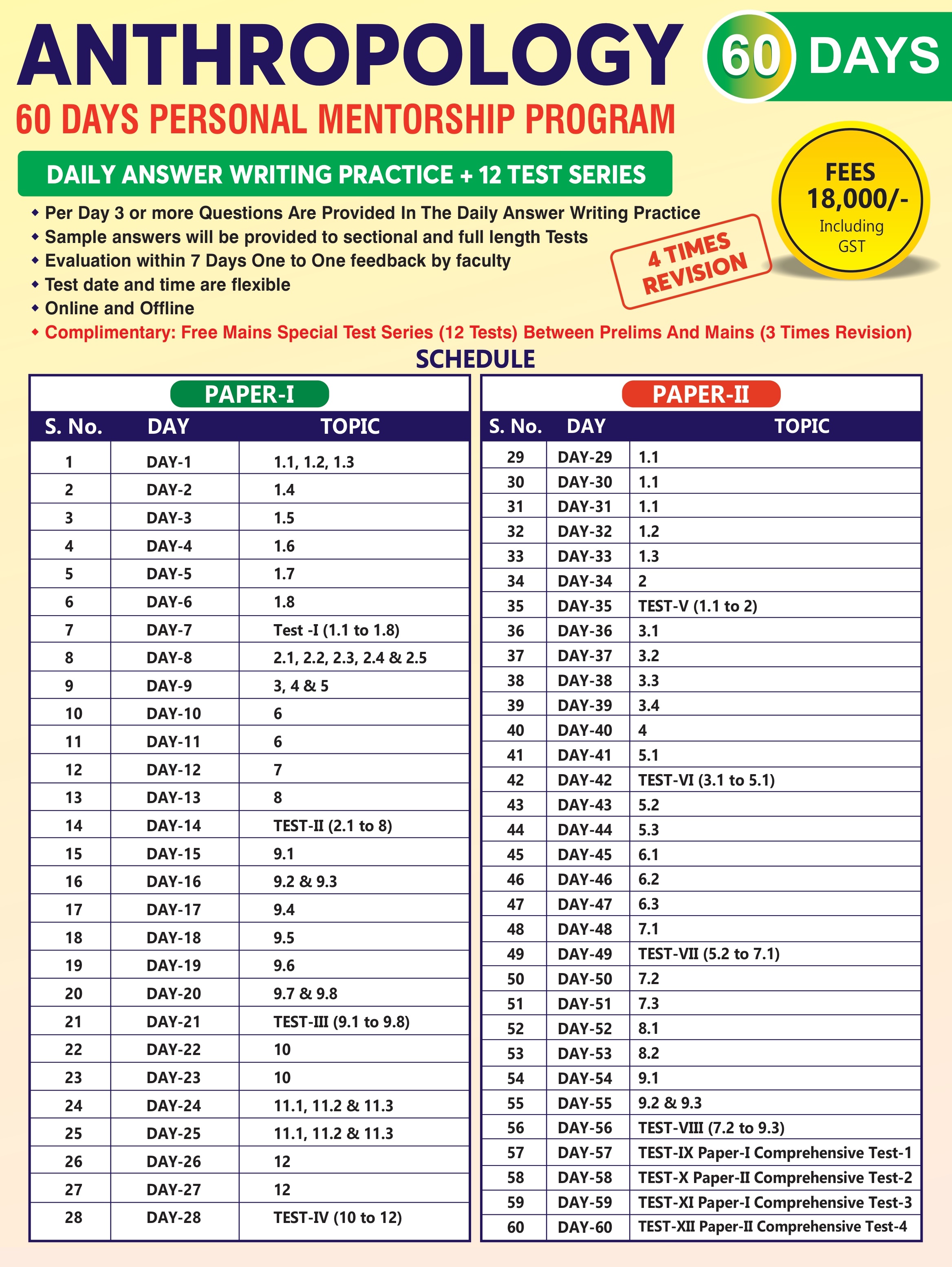
What is genetic counselling? Briefly discuss various steps involved in it.
(20 Marks) Anthropology Optional Paper CSE 2024
Introduction
Genetic counseling is a process that provides individuals and families with information, guidance, and support regarding genetic disorders, inheritance patterns, and the potential risks of passing on genetic conditions. It is particularly important for those with a family history of genetic disorders, individuals considering reproductive options, or those who have been diagnosed with genetic conditions. The goal of genetic counseling is to help individuals make informed decisions about their health, family planning, and medical care based on their genetic risk factors.
Main Body
Purpose of Genetic Counseling:
Risk Assessment:
Identifying the risk of an individual or family member inheriting a genetic disorder based on family history, medical records, and genetic testing.
Education:
Providing information about the nature of genetic disorders, inheritance patterns, the role of genes in health and disease, and the implications of genetic testing.
Support:
Offering emotional support to individuals and families who may face difficult decisions, such as whether to undergo genetic testing or consider preventive measures.
Who Needs Genetic Counseling?: Genetic counseling is recommended for various groups:
Families with a history of genetic disorders such as cystic fibrosis, Huntington’s disease, or hemophilia.
Couples who are planning a pregnancy and want to understand the risk of passing on genetic conditions.
Individuals with a personal or family history of cancers, particularly hereditary cancers like BRCA mutations.
Pregnant women who may have abnormal prenatal screening results indicating potential genetic disorders in the fetus.
Individuals diagnosed with genetic disorders seeking advice on disease management and treatment options.
Steps Involved in Genetic Counseling:
Step 1: Collection of Family and Medical History
This initial step involves gathering detailed information about the individual’s personal health history as well as their family’s medical background. A pedigree chart is often created, mapping out the occurrence of genetic disorders or diseases across several generations. This helps the counselor assess the likelihood of inheriting or passing on a genetic condition.
Example: A family history of breast or ovarian cancer may indicate a higher risk of BRCA mutations, prompting further genetic investigation.
Step 2: Risk Assessment
Based on the family history and any available medical records, the genetic counselor evaluates the potential risk of the individual or their offspring developing genetic conditions. This step may also involve assessing other risk factors, such as ethnicity, lifestyle, and environmental exposures.
Example: Couples from certain populations (such as Ashkenazi Jews) may have a higher risk of carrying specific recessive genetic disorders, such as Tay-Sachs disease.
Step 3: Genetic Testing
If deemed necessary, genetic testing is recommended to confirm the presence of specific genetic mutations or conditions. Testing can include blood tests, saliva samples, or other diagnostic procedures like prenatal testing (amniocentesis or chorionic villus sampling).
Genetic tests may be used for diagnosing existing conditions, predicting the risk of developing diseases (predictive testing), or screening embryos during in vitro fertilization (IVF).
Example: A woman with a family history of early-onset breast cancer might undergo genetic testing to determine if she carries BRCA1 or BRCA2 mutations.
Step 4: Interpretation of Results
After genetic testing, the counselor helps interpret the results, explaining what they mean in terms of health risks, potential treatments, and management strategies. The counselor must clarify the limitations of the test results, such as the possibility of false positives or negatives.
Example: A positive result for a BRCA mutation indicates a higher risk of breast and ovarian cancer, but does not mean the individual will definitely develop the disease. A negative result lowers the risk but doesn’t eliminate it completely.
Step 5: Communication and Decision-Making
The counselor presents the findings in a clear and non-directive manner, helping the individual or family understand the implications of the results for their health and family planning decisions. The counselor may provide information on preventive measures, such as lifestyle changes, increased screening, or prophylactic surgeries, as well as reproductive options like preimplantation genetic diagnosis (PGD) or adoption.
Example: After a positive genetic test for Huntington’s disease, the counselor might discuss the potential future health issues and reproductive options, helping the individual or family make informed choices.
Step 6: Emotional Support and Counseling
Genetic counseling often involves addressing the emotional and psychological impact of genetic testing. Receiving a diagnosis or learning about increased genetic risks can be distressing, and the counselor offers support, helping individuals and families cope with anxiety, grief, or uncertainty.
Example: A couple may need emotional support if they discover that both are carriers of a recessive genetic disorder like cystic fibrosis, which could affect future pregnancies.
Step 7: Follow-up and Long-term Planning
Genetic counseling does not end with testing. Long-term follow-up is often required, particularly for individuals at increased risk of developing genetic conditions. The counselor provides guidance on regular medical screenings, potential treatments, and preventive measures, while also offering ongoing emotional support.
Example: An individual with a positive genetic test for a cancer predisposition syndrome may need regular check-ups and screenings to monitor for early signs of cancer.
Challenges in Genetic Counseling:
Ethical Dilemmas:
Genetic counseling often raises ethical issues, particularly around reproductive choices, disclosure of genetic risks to family members, and the use of genetic information by insurance companies.
Psychological Impact:
Genetic information can have a significant emotional impact, potentially leading to anxiety, depression, or distress in individuals and families.
Access to Services:
In many regions, genetic counseling and testing may not be easily accessible, particularly in developing countries or rural areas where healthcare resources are limited.
Conclusion
Genetic counseling is a vital process that helps individuals and families understand the implications of genetic disorders and make informed decisions about their health and family planning. It involves a series of steps, from collecting family histories to providing emotional support, all aimed at helping people navigate the complexities of genetics. As advancements in genetic testing continue to expand, the role of genetic counseling will become even more important in personalized medicine, disease prevention, and reproductive health.
Anthropology Test Series Programme (Online + Offline))
We provide Anthropology Daily Answer Writing a range of programs designed to cater to various stages of UPSC preparation. Whether you're just starting out, have attempted the Mains before, or are getting ready for Mains 2024, we have the right option for you. Allow us to assist you in choosing the course that best fits your needs.
|
Level of Preparation |
Test Series Program |
Test Series Content |
Test Schedule |
|
Self-study of Anthropology Optional |
Anthropology 100 Days Personal Mentorship Program |
Daily answer writing, 34 sectional tests, 6 comprehensive tests, and complementary Mains Special 12 tests (between prelims and mains) |
|
|
Revise whole syllabus through Daily Answer Writing Practice and Tests |
Anthropology DAW Mentorship Program |
Daily Answer Writing Practice and 8 sectional and 4 Full Length tests |
|
|
Revise whole syllabus through Sectional and Full Length Tests |
Anthropology Tier- I T-40 Test Series |
34 Sectionals and 6 Full Length Tests |
|
|
Written Mains earlier and need more practice |
16-Anthropology Tier II Test Series |
10 sectional and 6 Full-Length Tests. |
|
|
Cleared Prelims 2023 and are preparing for Mains 2023 |
Mains Special 12 Tests program |
8 Sectional and 4 Full-Length Tests |
ANTHROPOLOGY MAINS SPECIAL COURSES
Enroll in our Anthropology Mentorship Program today and take the first step towards achieving your UPSC goals!
1) If you are going for Self study of Anthropology Optional and looking for a Comprehensive Program that includes Daily Answer Writing, 34 Sectional tests, 6 Comprehensive tests, and Complementary mains special 12 tests (between prelims and mains), our Anthropology 100 Days Personal Mentorship Program is the perfect choice.
2) If you want to revise Whole Syllabus through Daily Answer Writing Practice and 8 sectional and 4 full length tests, then our Anthropology DAW Mentorship Program is the best fit for you.
3) If you want to revise Whole Syllabus through 34 Sectionals and 6 Full Length Tests then Anthropology Tier- I T-40 Test Series is for you.
4) If you have written Mains earlier and need more practice, then our 16-Anthropology Tier II Test Series is a great option. This test series includes 10 sectional and 6 full-length tests.
5) if you have cleared Prelims 2023 and are preparing for Mains 2023,our Mains Special 12 Tests program is a must-have. This program includes 8 sectional and 4 full-length tests to help you prepare for the big day.
For more information on Vijetha IAS Academy’s Anthropology mentorship programs Deatils : https://vijethaiasacademy.com/anthropology-test-series
Anthropology 100 Days Personal Mentorship Program ( 7 + 3 Times Revision )

Anthropology 60 Days Personal Mentorship Program ( 4 + 3 Times Revision )

For more information: https://vijethaiasacademy.com/anthropology-test-series
Details Of Anthropology Classes Program
Top Anthropology Optional IAS Coaching Center in Delhi Vijetha IAS Academy | Best Anthropology Optional IAS Coaching in Delhi
Fee Structure:
- Tier 1: Rs. 55,150/- (3 Years Validity of Offline/Live Batch)
- Tier 2: Rs. 42,000/-
- Tier 3: Rs. 36,000/-
Batch Size: 50 – 60 Students
UPSC Notes
Anthropology Optional IAS Coaching Notes, IAS Exam Preparation Booklets, IAS optional coaching Notes, UPSC Coaching Notes, Video Lectures, Live Classes with faculty, Chat Facility Available
Teachers Name: N P Kishore Sir
Past Result
- Last Years Result 2023
- 35 Total Selections in CSE 2023
Google Reviews: 4.9 out of 5 stars
Website: Vijetha Anthropology Optional IAS Coaching in Delhi (https://vijethaiasacademy.com)
Faculties of Vijetha IAS Academy
- N P Kishore Sir
Features
- Vijetha IAS Academy offers Online and offline Courses for better preparation of Anthropology Optional Strategy for UPSC in Delhi.
- For better Anthropology optional Exam Preparation, Vijetha IAS Academy Delhi Conducts the Motivational IAS Session.
- Vijetha IAS Academy provides you with the CASE STUDIES on the pattern of the real-time IAS Exam which is helpful for better preparation of the Best Coaching for UPSC Anthropology Optional Optional IAS Examination.
- DAW & WAW – Revision Through Daily & Weekly Answer Writing Practice is offered by Vijetha IAS Academy for better result of the Anthropology Optional IAS examination.
Advantages of joining Vijetha IAS Academy
- Best Faculties for Anthropology Optional IAS Coaching in Delhi
- Best facilities, infrastructure and updated Case Studies Booklets and Notes for better preparation of the Anthropology Optional IAS Examination in Delhi.
- Best result in Past years for Anthropology Optional Strategy for UPSC Examination in Delhi
- Best Rated coaching institute for Anthropology Optional IAS Examination in Delhi.
- Vijetha IAS Academy also provides recorded lectures videos, notes which is very helpful for better preparation of Anthropology Optional IAS Coaching in Delhi
Fees Structure of Vijetha IAS Academy
|
Tier 2 |
Tier 1 |
Tier 3 |
BATCH STARTS FROM |
|
42,000/- |
55,150/- (3 Years Validity Offline/Live Batch) |
36,000/- |
REGISTRATION – START |
Fees Structure of Vijetha IAS Academy
|
Course Name |
Fees Amount |
Course Duration |
|
GS Offline (Pre + Mains+ CSAT) with Essay+Answer Writing |
Rs.99,000 (Including GST) |
400+ Days |
|
GS Online |
Rs.18,999 (Including GST) |
400+ Days |
|
GS Mentorship Programme |
Rs.29,999 (Including GST) |
1 Year |
For more information on our courses, visit our Anthropology Courses page. Explore our Test Series and Online Courses for flexible learning options.
Vijetha IAS Academy
Add. 2nd Floor, 50, Shankar Road, Block 7, Old Rajinder Nagar, Rajinder Nagar, New Delhi, Delhi 110060
MOB. 096508 52636
Open 7 Am : Closes 9 PM
Keywords: genetic counseling, anthropology 2024 question paper, Anthropology optional subject question paper 2024, Anthropology optionals 2024 question paper, Anthropology Optional Coaching UPSC, Vijetha IAS Academy Anthropology, Anthropology crash course UPSC, Anthropology daily answer writing UPSC, Kishore sir Anthropology
